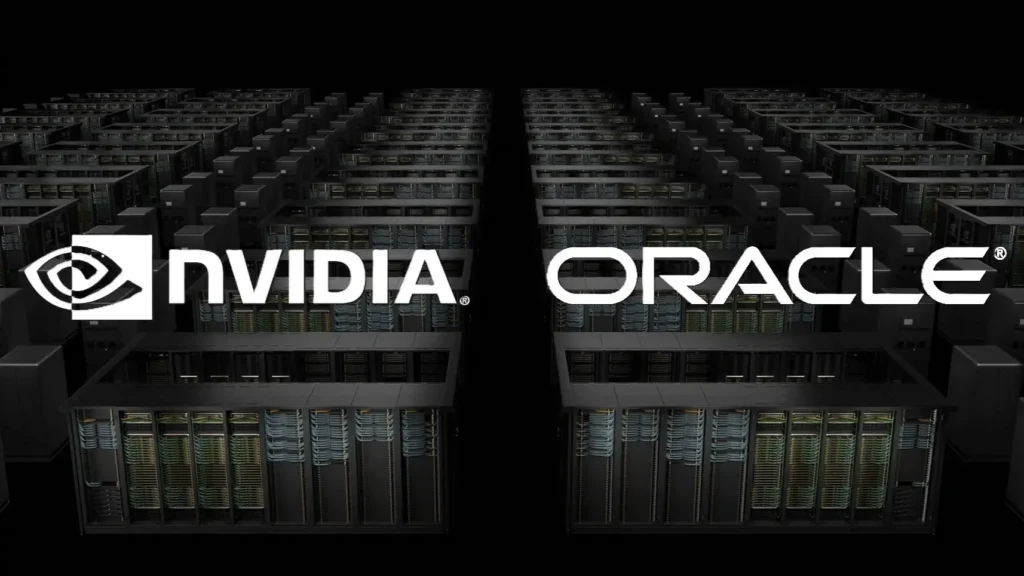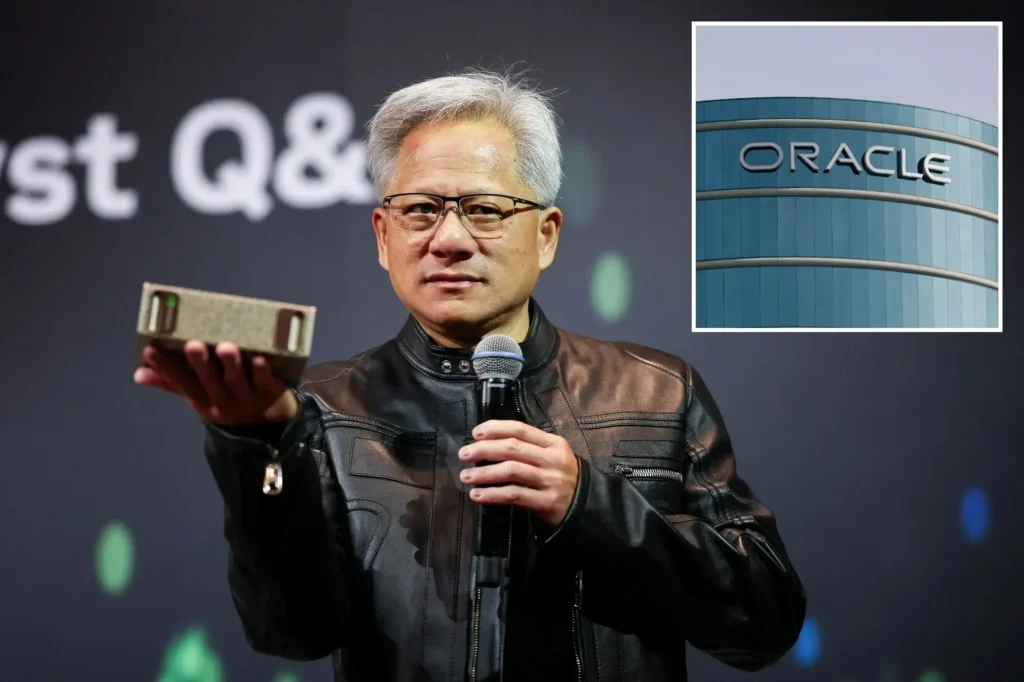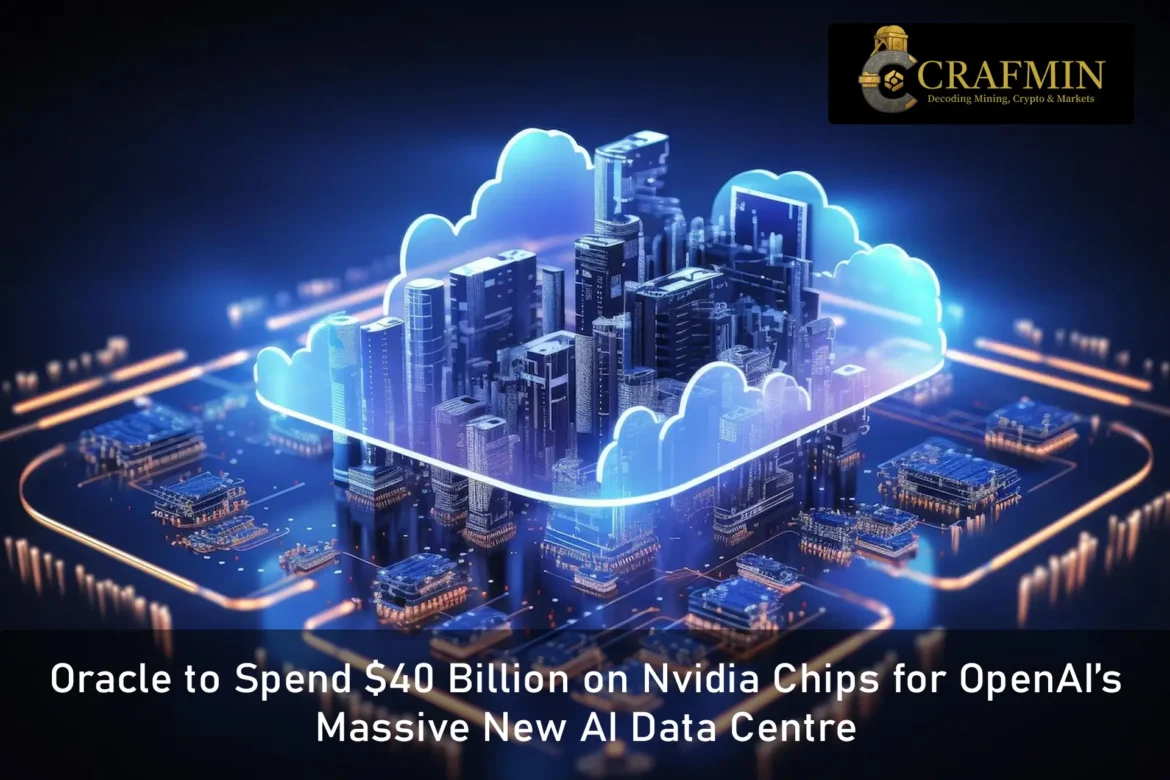Oracle’s Huge Investment in AI Infrastructure
Oracle is preparing to spend about $40 billion on Nvidia’s most advanced AI chips to power a new data centre for OpenAI in Texas. This investment marks a major step in building the massive computing resources needed for artificial intelligence to grow and improve.
OpenAI is known for developing some of the most advanced AI systems, but these require huge amounts of processing power. Oracle plans to buy roughly 400,000 of Nvidia’s latest “GB200” chips, designed specifically to train and run complex AI models efficiently. Rather than selling the chips directly to OpenAI, Oracle will lease the computing capacity back to them, allowing OpenAI access to massive processing power without having to own the hardware outright

Image 1: Oracle & Nvidia (Source: X)
Global Expansion and the Future of AI Infrastructure
OpenAI isn’t just focusing on the US. The company recently revealed plans to build an even larger data centre in Abu Dhabi, UAE. This facility is expected to operate with a staggering 5 gigawatts of power—over four times the size of the Texas site—and will include more than two million of Nvidia’s latest AI chips.
The Abu Dhabi project is in partnership with Emirati AI company G42 and is part of a global effort to create hubs of AI infrastructure. These new centres represent a shift toward data centres built specifically to handle the enormous demands of AI workloads.
Powering these advanced AI systems requires not only cutting-edge chips but also vast amounts of electricity. These specialised data centres act like huge computing factories, processing massive volumes of data rapidly. Their construction highlights the vital role of reliable and scalable infrastructure in driving AI innovation forward.
The Scale of the Abilene Data Centre
The new facility in Abilene, Texas, is part of a bigger initiative known as the Stargate project. This ambitious plan aims to establish some of the largest AI data centres in the US. When finished, the Abilene site will draw around 1.2 gigawatts of power—enough to supply a small city.
The project includes eight buildings filled with thousands of Nvidia’s advanced AI chips. Construction began in mid-2024, and the centre is expected to be fully operational by mid-2026. Oracle has committed to leasing the site for 15 years, securing a long-term stake in the AI infrastructure landscape.
Backed by Crusoe and Blue Owl Capital, who own the site, the project has raised $15 billion through a mix of loans and investment. Major banks like JPMorgan have provided the majority of the financing, showing just how significant this development is.
The Abilene data centre will rival other large-scale projects. Elon Musk’s “Colossus” data centre in Memphis aims to house about one million Nvidia chips. Amazon is also developing a facility in northern Virginia with power capacity expected to exceed one gigawatt.
A Shift in OpenAI’s Computing Strategy
Until recently, OpenAI depended almost entirely on Microsoft for its computing power. Microsoft invested billions into OpenAI, providing much of its cloud computing through credits. However, OpenAI’s need for processing power soon outpaced Microsoft’s supply capabilities, leading to an end to their exclusivity agreement earlier this year.
With Oracle and others joining the Stargate project, OpenAI is now diversifying its access to high-performance computing resources. Stargate itself is a massive undertaking, aiming to invest as much as $500 billion over the next four years in data centres supporting AI development across the US.
Along with OpenAI and SoftBank, Oracle and Abu Dhabi’s MGX investment fund have each committed billions to Stargate. These investors will own stakes in the project, although Stargate hasn’t yet directly funded any data centre construction.
This change in strategy highlights the growing demand for AI infrastructure. As AI models become more complex and widespread, having access to dedicated, powerful computing centres is crucial.

Image 2: Nvidia CEO Jensen Huang (Source: New York Post)
What This Means for AI’s Future
Oracle’s massive purchase of Nvidia chips signals just how big AI development has become. This isn’t simply about buying computer parts; it’s about creating the foundation necessary to support the next generation of AI breakthroughs.
These investments will let OpenAI and other companies build stronger, more capable AI systems. The competition among tech giants to create huge “AI superclusters” is intensifying as demand rises.
Think of these projects as enormous, specialised factories—not for physical goods, but for computing power tailored to AI. They’ll crunch enormous amounts of data quickly, enabling AI systems to learn and function better.
As AI becomes central to many industries and daily life, infrastructure must keep up. Projects like Stargate and investments from major players like Oracle and SoftBank are building the backbone for this future.
The data centres being built today will support AI systems that could transform how people work, communicate, and solve problems. This huge investment shows how seriously the tech world is taking the AI revolution—it’s putting enormous resources into making AI more powerful and widely available.

